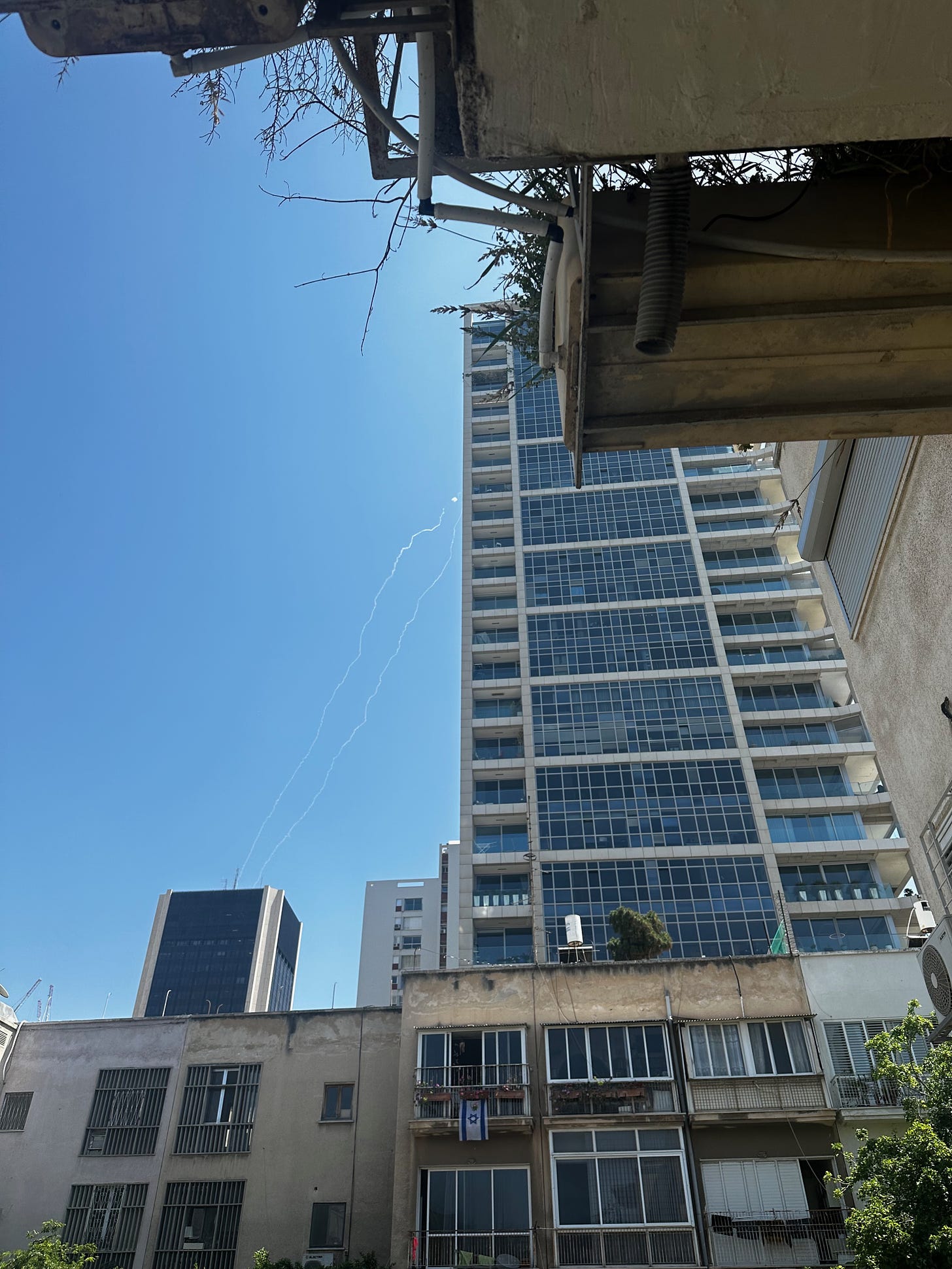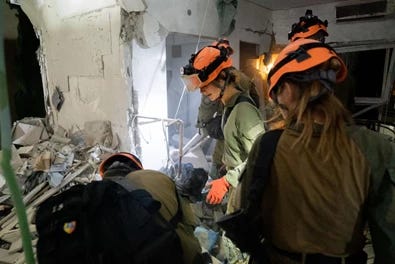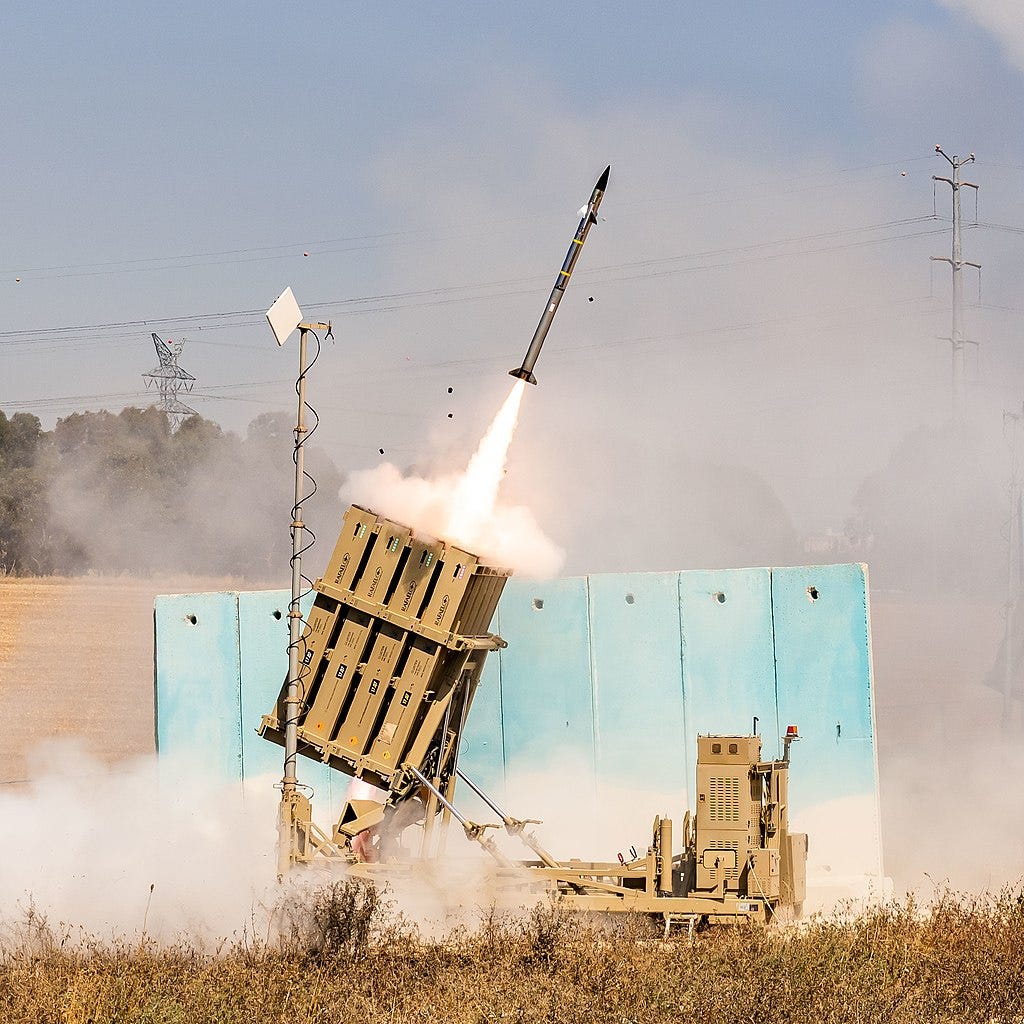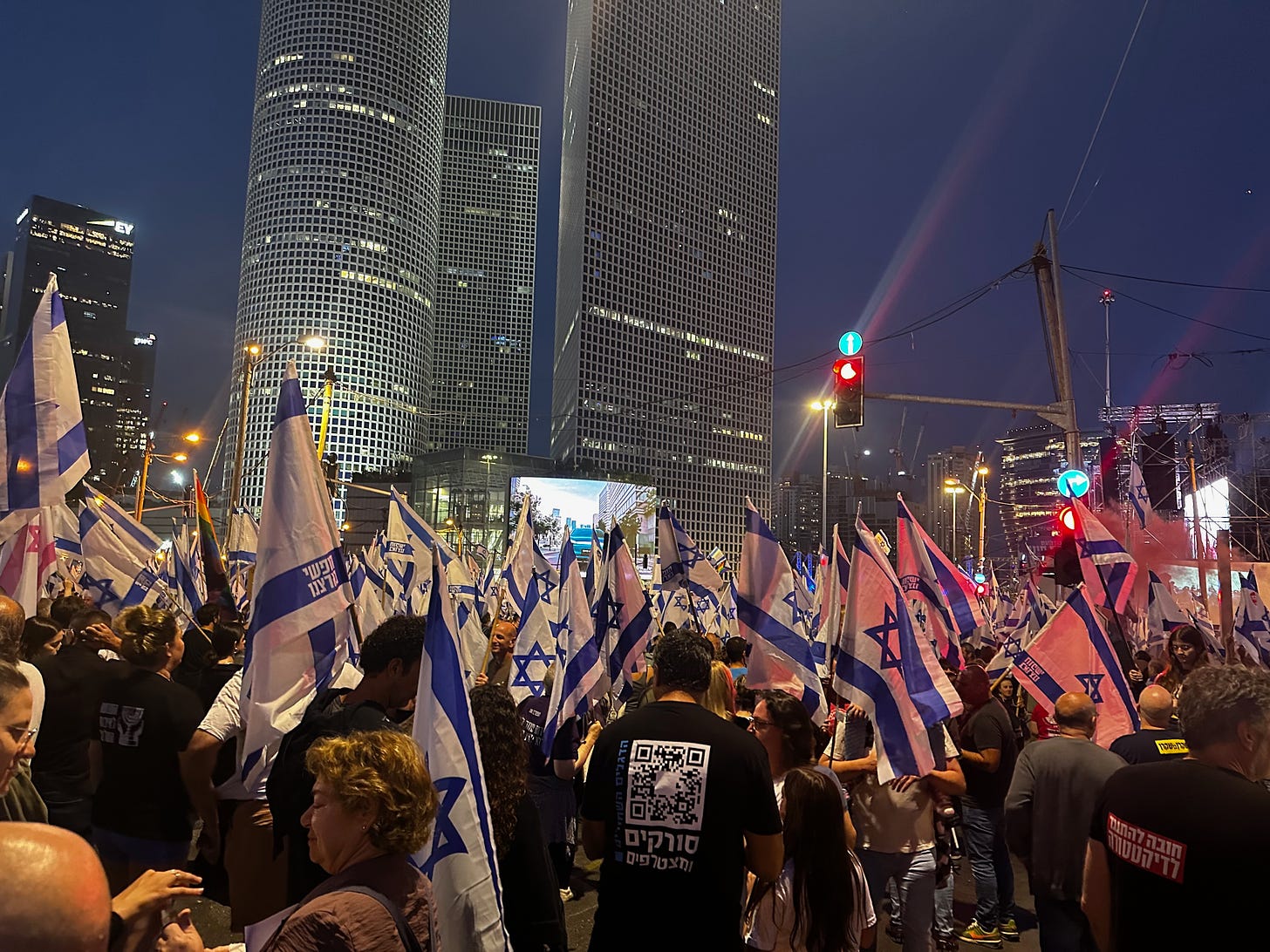Tel Aviv Diary May 12, 2023
Another round of fighting with Gaza- to what end? Plus the budget, business, some history and a restaurant review
LATEST ROUND OF FIGHTING WITH ISLAMIC JIHAD
This week's news cycle has largely been dominated by our military engagement with the Islamic Jihad in Gaza. The conflict began with a coordinated IDF attack on the residences of three Islamic Jihad leaders, resulting in their deaths, along with several of their family members on Monday night. The attack was unexpected, and the three homes were targeted within seconds of each other. The stated rationale behind this action was to retaliate against an Islamic Jihad missile strike, in which they launched over 100 rockets a week earlier, following the death of an incarcerated Islamic Jihad member who was on a hunger strike.
While it might be tempting to conjecture that this current military action was motivated by Netanyahu's political needs and his declining poll numbers, however, it’s important to look at the larger picture. The primary trigger for this operation was to disrupt the Islamic Jihad's attempts to establish a new 'balance of terror', where any West Bank incidents or prisoner-related issues could serve as a pretext for missile attacks. Another factor was the perception that the Islamic Jihad, among others, are misinterpreting the protest movement, assuming that internal discord signified weakness. Lastly, as the Islamic Jihad is directly funded by Iran, and Israel is currently engaged in a covert conflict with Iran across multiple fronts — therefore, any action that weakens an Iranian proxy is considered beneficial.
Immediately following the attack on Gaza, residents in the vicinity were advised to stay near their homes or shelters. Many chose to relocate to the residences of friends or relatives in the North. A day later, on Wednesday, the Islamic Jihad began its retaliation for the targeted assassinations of its leadership. Over a span of two days, they launched nearly 1,000 missiles aimed at targets close to the border, and as far away as Tel Aviv. The Iron Dome Defense System successfully intercepted 90% of the incoming rockets that it engaged, although it doesn't attempt to intercept rockets projected to land in open fields. Nonetheless, some rockets did manage to penetrate the defense.
On Thursday evening, a missile struck Rechovot, destroying an apartment, causing the death of one elderly woman, and injuring others. Additional rockets hit Sderot and other locations close to the border. During the conflict, Israel managed to eliminate several high-ranking Islamic Jihad operatives, including the head of its rocket division and his deputy.
On Friday morning the Islamic Jihad fired a round of rockets toward Jerusalem. This barrage greatly reduced any chance of a ceasefire in the immediate future, although sometimes ceasefires have been known to occur when least expected. On the other hand, there is the fear that if this goes on too long, Hamas will feel it has no choice but to engage. If Hamas enters the clash, it would take the conflict to a whole new level.
This encounter is having a negative impact on Israel’s economy. In the southern region around Gaza, commercial activity has come to a standstill. However, in Tel Aviv, life continues with few interruptions. A massive concert in Yarkon Park, featuring Aviv Gefen, drew a crowd of almost 40,000. However, many residents chose to work from home, resulting in noticeably quieter streets and sidewalks. This marks my third experience in Tel Aviv under the threat of rocket attacks, and each time it feels more routine and less alarming. Still, it's an odd sensation to constantly be aware of the nearest shelter in case of a siren. Last year, I found myself caught in Habima Square during an alarm.
When we evaluate the aftermath of this recent conflict, we must ask ourselves, was it worth the cost? Will we find ourselves in a better position once this skirmish concludes? While there's no denying the initial tactical victory, the bigger question remains— will this offensive truly bring about any change? Over the past two decades, we've eliminated countless terror leaders, yet new ones always emerge to fill the void. Was the disruption to the lives of those residing in the south worth it? Can the loss of lives in Gaza, and of the woman in Rechovot, be justified? If this conflict brings about a fundamental shift, one might argue yes, but I have my doubts that it will. Are we merely "mowing the lawn," i.e., undertaking occasional operations to maintain a certain level of deterrence? We seem adept at tactical actions, but strategic planning appears to be our weak spot. Initially, we aimed not to strengthen Hamas's rule in Gaza, but it's now clear they're here to stay. So, what should be our medium and long-term plans? Unfortunately, no one seems willing to discuss this, because no one appears to have the answers.
THE PROTEST MOVEMENT
In recent days, there have been calls for the protest movement to address the issue of occupation. However, I believe this would be a mistake.
Protests against changes in the judicial system, or against the fact that the ultra-Orthodox aren't bearing their fair share of societal burdens are specific and potentially achievable goals. Protests against the occupation, while morally justified, lack a clear path forward. While small demonstrations calling for peace have taken place, the reality is that peace requires cooperation from both sides, and many Israelis, myself included, doubt that peace is attainable in this generation. That doesn't excuse our actions in the West Bank— but that's a topic for another time.
REFLECTIONS ON OUR ACTION IN GAZA
This brings me to my final thought on the Gaza actions. We knew that when we targeted the leaders of the Islamic Jihad, there was a high likelihood of also killing innocent women and children in or near the targeted residences. Yet, the decision was made to proceed. I supported the pullout from Gaza in 2005 under the belief that we could decisively respond if missile attacks continued. That view was clearly naive. According the the laws of war, a nation may not target innocent civilians. However, if a military target is located amongst citizens, they are considered “acceptable collateral damage”. Can you ever justify killing children? Can someone plan rocket attacks by day, and expect to sleep safely at home at night with their children?
Although we do our best to limit civilian casualties, the claim that the IDF is the "most moral army in the world" seems far-fetched after 50 years of occupation. We might be the most moral army in the Middle East, but I doubt we hold a moral high ground compared to the Swedish or Dutch armies. When Israel's Channel 13 highlighted the civilian deaths from the targeted missile attacks by the Israeli Air Force, they were criticized by the Minister of Communication, who accused them of acting as a proxy for Al Jazeera. Unsurprisingly, a Channel 13 news crew was subsequently attacked by a government supporter. We often speak of our victimhood, yet overlook the hundred Palestinians we've killed this year in the West Bank. While many of these incidents may well have been justified, the cumulative effect of the continuous rounds of violence is not bringing peace any closer. Today’s peace demonstrators may be naive, but those who believe Israel can do no wrong are equally misguided.
COALITION DISCONTENT
With just over two weeks remaining to pass the budget, a sense of urgency is setting in. This week, the budgetary tensions were somewhat overshadowed by our military conflict with the Islamic Jihad. If not for this, the budgetary issues would have made more headlines.
The week began on a disconcerting note, with the Jewish Home Party decision to abstain from Knesset votes. The party's reluctance stems from Ben-Gvir’s dissatisfaction with the government's direction, which he feels deviates from the expected right-wing norms.
Adding to the turmoil, the European Union’s Embassy in Israel opted to cancel its annual Europe Day celebration. This decision was made in response to the coalition's choice to select Ben-Gvir as its representative speaker, a figure who is considered an anathema by most Western governments.
ULTRA-ORTHODOX UMBRAGE
Ultra-Orthodox leaders have also been vocal about their discontent with the current government, stating that the commitments made by Netanyahu during coalition negotiations have not been fulfilled. Their primary concern is the status of a law to grant permanent military exemptions to Yeshiva students. It is highly unlikely that this law will be passed before the budget, and once the budget is approved, Netanyahu might have less incentive to address this contentious issue.
Meanwhile, a detailed list of the financial commitments made to the ultra-Orthodox community, which appear to be largely incorporated into the upcoming budget, has been unveiled. The list includes:
Allocation of 1.18 billion shekels is proposed to equalize salaries of Haredi teachers with their secular counterparts — despite the fact most of these teachers lack formal training, and none hold a Master’s degree.
An additional 2.5 billion shekels are set to be channeled into Yeshiva funding.
The “Ministry of Jewish Tradition” is due to receive a boost of 500 million shekels.
The “Authority for the Promotion of the ultra-Orthodox” is also slated for a 500 million shekel budget.
The “Authority of Jewish Identity” is expected to get an injection of 285 million shekels.
60 million shekels are allocated for the construction of residential schools in the West Bank, among other high budget items.
While none of these expenditures would necessarily bankrupt the state, it's worth noting that they are intended to fund programs and projects that face substantial opposition from a significant portion of Israelis. In the case of the ultra-Orthodox community, these measures that will help isolate them from the larger society could potentially exacerbate their poverty and dependence on religious and community leaders.
GOVERNMENT APPOINTMENTS: FRIENDS AND FAMILY
The current government has been criticized for making appointments based on individuals' affiliation with the Likud party and their connections to Likud ministers, rather than on merit or qualifications. This approach appears to have been intensified with the decision to delegate control of Government Companies to Minister David Amsalem. Barry Topf, a close friend with many years of experience in Israel’s economic circles, wrote an insightful piece on this issue this week, which you can access at the following this link.
BUSINESS
Enlight, one of Israel leading alternative energy companies, had an impressive first quarter with profits of $24 million, up 400% from last year. The rise in profits is a result of electricity producing projects coming on line — including a large wind farm on the Golan Heights, as well as one in Spain. A solar energy plant in Arad is also now operational
.
Nice Software reported an excellent Q1, beating analyst expectoration with a profit of $77 million for the quarter. Nice projected an increase in sales of 8% for the year and a rise in profit of 11%.
HOUSING
Israel’s housing market is cooling rapidly. The value of mortgages issued dropped 60% this past month compared to the previous year.
A PIECE OF HISTORY— WAR OF INDEPENDENCE: Part 2
During the early part of 1948 Jerusalem was cut off and the Haganah seemed to be struggling. Ben Gurion feared losing international support and thus he demanded that the army shift to the offensive, and press3 forward to open the road to Jerusalem. This initiative became possible thanks to the successful smuggling of large quantities of small arms into the country. For the first time, troops did not have to share rifles and machine guns.
“Operation Nachshon,” the first major offensive in Israel’s War of Independence, aimed to capture a corridor along the road to Jerusalem and thus secure this route. The major effort in this battle was the fight for Kastel, which the Haganah won, after a fierce battle on April 10, 1948. Abd al-Qadir Husayni, the Mufti's military leader, was killed during the battle, which effectively ended the involvement of the Mufti's forces in the war. However, the capture of Kastel was only one of the objectives. The goal was to capture all the Arab villages that had been used as bases for fighters who attacked convoys to Jerusalem.
One of those villages was Deir Yassin, on the outskirts of Jerusalem. The Irgun, the militia under the command of Menachem Begin, was responsible for attacking Deir Yassin. The attack, which took place on April 9, met stiff opposition, and eventually involved house-to-house fighting. These skirmishes included indiscriminate attacks on houses inhabited by women and children.
The result was the death of 100-120 villagers, a number that was quickly exaggerated. However, the impact of Deir Yassin was much greater than the conquest of one village, or the death of 120 people, at least half of whom were combatants. As stories of the day spread, they became more and more lurid, resulting in widespread panic among Arab villagers and prompting more of them to flee.
An immediate consequence of the attack was a retaliatory assault on a convoy of Jewish doctors and nurses heading to Hadassah Hospital on Mount Scopus. The convoys generally benefited from a British escort. However, on April 13, no British escort showed up. The convoy set off without one, and as it moved forward, a mine went off, blocking their advance. Some vehicles were able to return to West Jerusalem, but two armored buses and two escort vehicles were trapped. The force was able to fend off the attackers for five hours.
In the North, the Arab Liberation Army, led by Fawzi al-Kawukji, began a concentrated assault on Mishmar Ha’emeq, but was defeated. The forces were then compelled to withdraw to Jenin. This defeat destroyed the morale of the Arab villages in the area, and soon they all chose to flee.
In mid-April, the Haganah launched “Operation Yiftach”, with the goal of liberating the upper Galilee. On April 18, the Palmach captured Tiberias. On April 21, as the British withdrew from the city of Haifa proper, concentrating their remaining forces in the port area, a brief battle for the city ensued and was quickly won by the Haganah. By May 10, the Arab parts of Safed were captured, and by May 16, Akko was captured. On May 13, Jaffa was captured
.
Back on the Jerusalem front, the Palmach successfully seized most of the major British installations in Jerusalem. However, on May 14, the Etzion bloc fell to the attackers from the Arab Legion.
The period leading up to independence was one of successful consolidation. All of the areas allotted to the Jewish State in the Galilee were firmly under Jewish control, as well as some areas that were to have been part of the Arab State. The coastal plain was secure, as was Jewish Jerusalem. The major areas of concern remained the road to Jerusalem and the many isolated settlements in the south.
A TASTE OF TEL AVIV— Gveret Kwaytiew
RESTAURANT REVIEW, by Tali Schulman
Over the course of the past few years an influx of small asian restaurants have opened in and around Shuk Hacarmel. Of the many, Gveret Kwaytiew is probably my favorite. Located in the bottom of the meat road on the Shuk, right around the corner from M25, Gveret Kwaytiew is found in a small corner with only a few very casual tables. They are most well known for their clear broth soups most similarly resembling Pho. While the soups are definitely worth checking out, the first courses is where the magic really is. Their Som Tom (papaya salad) is possibly my favorite in the city!
For more Tel Aviv restaurant recommendations, you can find me on Instagram @talischulman where I save all my food adventures in my highlights!











